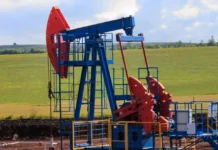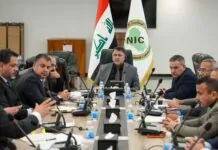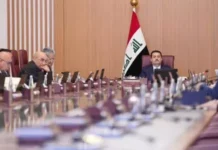Tishwash: Kurdistan retirees rush with “tremendous human momentum” in front of banks to receive their salaries..
This morning, Saturday (March 30, 2024), banks in the governorates of the Kurdistan Region witnessed a huge human momentum by retirees to receive their salaries.
The “Baghdad Today” correspondent said, “The banks of the Kurdistan region witnessed this morning a huge human momentum from retirees to receive their salaries.”
Last Thursday, the Ministry of Finance and Economy of the Kurdistan Regional Government announced the employee salary schedule for the month of February.
According to the schedule published, and seen by “Baghdad Today,” “the distribution of salaries will begin starting on Saturday, as the Ministry of Health, Finance, Interior, retirees, social affairs, and people with special needs will be the first to receive the salary.”
On Wednesday, the Kurdistan Regional Government announced the distribution of employee salaries for the month of February and the preparations to secure salaries for the coming months. Link
CandyKisses: Iraq-Jordan power line to see the light tomorrow, Saturday
Baghdad – Iraq Today:
The Director General of the Jordanian National Electric Power Company Amjad Al-Rawashdeh said that the Jordanian-Iraqi electrical interconnection line will enter service next Saturday.
The Jordan News Agency (Petra) quoted Rawashdeh as saying that the line will be shared between the Jordanian Risha electric stations and the Iraqi Rutba station at a voltage of 132 kilovolts, to feed the loads of the Rutba area near the border with Jordan.
On February 11, 2024, in the capital, Amman, Iraq and Jordan signed a document to provide the Iraqi side with 40 megawatts of electricity in the first phase, as the two parties considered the contract as part of a more comprehensive Arab plan for the Arab common market for energy in the future.
The Iraqi Ministry of Electricity announced the completion of the operation of the Iraqi-Jordanian electric line, stressing that the date of entry of the line into service will be next Saturday, March 30.
She added that the line will be shared between the Jordanian Risha electric stations and the Iraqi Rutba station, and at a voltage of 132 kilovolts to feed the loads of the Rutba area near the border with Jordan.
************
CandyKisses: Among them are the ones related to American sanctions and exchange rates. Government clarifications on many economic files
Economy News – Baghdad
The technical adviser to Prime Minister Mohamed Shia Al-Sudani, Friday, while explaining that the government is serious about changing and amending the salary scale for state employees, indicating that stopping the Central Bank initiative made investment residential complexes the monopoly of the well-off.
Mohammed Sahib al-Daraji said in a televised interview followed by “Economy News”, that “the visit of the Prime Minister to Washington will be important because America is an important player in the region and these data make the Iraqi government required to deal with the file of the relationship with Washington at the economic and financial level, especially through the control of the US Federal on Iraq’s funds from the sale of oil.”
He added, “Sudani’s visit is important and there are many files that will be resolved, including the file of money, the presence of US international forces, the file of energy and water and the climate file,” considering that “the visit comes to develop a new framework for the relationship.”
Al-Daraji explained that “the US sanctions on private banks are not their right, but their control of Iraq’s money made them behave in this way.”
He pointed out that “the difference between the exchange rate of the dollar against the dinar will be resolved soon through some of the measures that the government seeks to implement, which limited the exchange rate to 2000 dinars against the dollar,” expecting that “the exchange rate stabilizes at 1480 and 1470 dinars against the dollar.”
Al-Daraji pointed out that “Iraq does not suffer from a cash liquidity crisis because Iraq obtains liquidity by selling oil in dollars and selling it inside Iraq and obtaining dinars from the inside and recycling it,” noting that “the current crisis is not a liquidity crisis, but the delay in budget schedules is what led to the existence of this crisis, which arises from the cessation of the conversion of dollars into dinars, through intermediary banks.”
He explained that “the recent decisions of the Council of Ministers on raising the price of fuel, improved gasoline and super were part of a package of decisions, the most important of which was to reduce the public debt of the country through the reduction and cancellation of some loans to reduce the public debt to $ 10 billion, meaning that the public debt is less than 10% of GDP, as for the subsidized “gasoline” or other subsidized goods are smuggled continuously, noting that “the target of this decision are high-income people and simple citizens will not be affected by this The decision in addition to seeking self-sufficiency in oil products.”
Al-Daraji pointed out that “the Iraqi family, according to planning, consists of 5.6 people, which means 6 million families, which means cars with the number of families or more, which means the re-imposition of the individual and marital system, and this is unacceptable by citizens, but these decisions with changing the working hours of some ministries to reduce the momentum in the streets.”
The adviser to the Prime Minister stressed that “political tensions are what brought Iraq to this stage by reducing the size of the achievements achieved by the government, but the situation now in Iraq has changed because of awareness, which has become a reality that political tensions can not change,” noting that “the country did not get anything during the previous periods and lost confidence in democracy, but there are signs of the return of confidence and satisfaction with what will result from the current government.”
In addition, Al-Daraji pointed out that “the monetary mass in Iraq is very high and the Finance Committee should review its information because the financial mass is large and there is no problem in it,” explaining that “the monetary mass exists among citizens and trades in the market through the disbursement of the necessary needs of citizens,” noting that “Iraq if it sells $ 8 billion and becomes in the Central Bank and what is converted into dollars is equivalent to what the bank sells from the dollar through the platform It is the process of converting dollars into dinars, and it is possible to transfer the surplus to industry and investment in residential complexes to reduce the suffering of citizens.”
Al-Daraji pointed out that “electronic payment enhances the output of the cash mass stored by citizens through sales transactions between citizens, and it is possible to establish holding companies for the participation of citizens, but we need insurance in order for these projects to succeed.”
On the slogan of Made in Iraq, the adviser to the Prime Minister stressed that “this is a national demand for this government, which is very serious to preserve hard currency and develop the Iraqi economy,” noting that “the current government announced for the first time that it will guarantee the investor through sovereign guarantee and this is an encouragement for Made in Iraq, which has the raw materials necessary for industries and evidence cement industry, which has succeeded in achieving self-sufficiency in Iraq.”
He pointed out that “America, which numbers 300 million, has 3 million employees, while Iraq has 8 million employees, and this is the result of poor planning, which makes the Iraqi economy restricted,” and explained that “the salary scale must be adjusted and the government is serious about changing it to reduce the differences between employees,” noting that “changing the salary scale will be by raising the salaries of employees and not reducing some.”
“The abolition of military industrialization was a big mistake committed by Bremer and its results were catastrophic for Iraq because the institution was a high-end art institution that was misused by the former regime,” al-Daraji said.
Al-Daraji explained that “the government has supported some industries with sovereign guarantees, including a large glass factory in Najaf, in addition to the establishment of a petrochemical complex in Basra, in addition to the construction industries in Samawa and Diwaniyah, and the government’s biggest priority is the localization of the pharmaceutical industry, which costs the country hard currency estimated at $ 6 billion per year,” noting that “the establishment of factories needs financing, protection and marketing, and the government helps finance the project and protect it from importer competition in addition to marketing assistance.”
Al-Daraji pointed out that “the pharmaceutical industry needs successful commercial advertising that gets rid of the idea that foreign production is better than Iraqi, so we need good marketing and change this idea about the Iraqi product in order for these projects to succeed.”
Regarding the new Sadr City, Al-Daraji said, “Work is underway to select designs for the city’s infrastructure and select solid Chinese companies to develop this city, which is expected to start work within the next two months,” noting that “the government supports the presence of Arab and foreign investors to encourage the provision of service to citizens.”
He considered that “stopping the initiative of the Central Bank is a mistake reserved because it made investment complexes the monopoly of the well-to-do,” explaining that “Sadr City residential will be available to the poor classes of citizens because of the support of the government,” noting that “the government seeks to take out civil government departments to the parties to reduce the population momentum in the center of the capital.”





